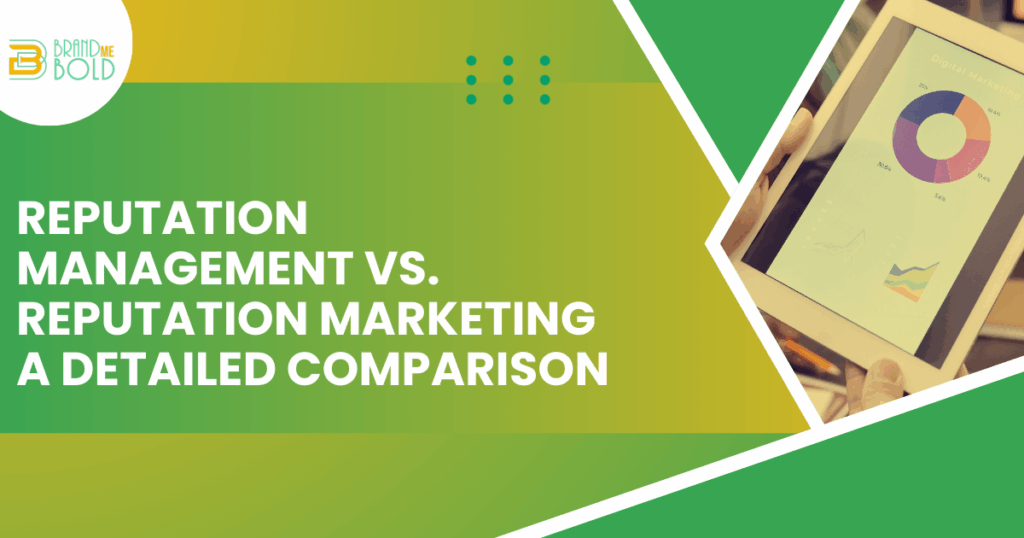As of 2025, a single TikTok or tweet may change the opinion of the public in under a minute. This is putting pressure on every brand, especially personal brands to master reputation marketing and reputation management. While most people think of them as the same thing, the approaches differ. Understanding these differences is the first step towards developing a comprehensive reputation management strategy which both protects and promotes your good name.
What Is Reputation Management?
Reputation management is the protective practice of identifying, containing and mending damages done to perception. Consider it a form of digital crisis management. Reviews, social media and news reports are monitored to track anything that could potentially damage trust. Whenever a problem arises – be it a scathing one-star review or a misleading blog post – you respond immediately, fix the inaccuracies and activate Remove Negative Content Services, if needed, to eliminate defamatory claims, inaccurate facts, or statements. The objective is to prevent damaging narratives from overshadowing search results or deterring potential buyers.
On a more personal level, personal online brand reputation management is the exact same playbook. Now, influencers, executives and even freelancers track mentions of their names just as corporations track brand names. Timely responses paired with transparent apologies turn critics into cautious allies and show future customers you care.
What is Reputation Marketing?
If reputation management is the defence, reputation marketing is the offence. It aims to amplify praise sentiment such that praise, not complaints, leads the narrative. Instead of sitting back and waiting for reviews to come in, you actively promote posting testimonials, showcase amazing case studies and collaborate on brand collabs and sponsorships that promote your business and positively highlight your business. The more quality evidence you spread, such as star ratings, success stories and press shout‑outs, the simpler it becomes for prospects to trust you.
Together, the two practices create a virtuous loop: management mitigates the fallout while marketing amplifies sentiment. Ignore either side, and the public perception gets lopsided. Understanding the 4 Differences Between Reputation Management and Reputation Marketing helps businesses apply the right tactic at the right time—rather than treating both as one and risking ineffective efforts.
Key Differences Between Reputation Management and Reputation Marketing
| Aspect | Reputation Management | Reputation Marketing |
|---|---|---|
| Approach | Reactive | Proactive |
| Purpose | Repair & protect reputation | Promote & amplify reputation |
| Focus | Negative mentions, crises | Positive reviews, brand advocacy |
| Methods | Responding to issues, removing false claims | Collecting testimonials, influencer marketing |
Together, they form a dual strategy: one protects your image, the other enhances it.
Why the Distinction Matters
Most companies approach reputation as a single to-do item: “Get good reviews.” This approach misses the issue of tone and timing. Reputation management efforts start during or just after a crisis. It’s reactive, measured, and private. Think direct message (DM) apologies and phone call problem-solving. In contrast, reputation marketing is proactive, exuberant, and conducted on public platforms; it turns victories into social media reels, blasts out victory emails or blogs. Both are important but must never be applied interchangeably. There is a clear ineptness in trying to “market” your way out of a scandal. Similarly, attending to all private praise leaves powerful endorsements stagnating in your inbox.
This balance between handling crisis and building image is a core part of Why and How to Build Brand Reputation Resilience —ensuring your brand remains trusted, even when under pressure.
A Two-Phase Framework
Monitor Everything
Create alerts for your brand name, products, and key executives. Social media, review platforms, and news websites update almost every minute. Timely detection is crucial if you wish to put into practice effective online brand reputation management.
Take Action First, Market Later
Whenever there are problems that arise due to negative buzz, resolve them as fast as possible. After solving the issue, publish a transparent recap, encouraging the delighted customer to provide an updated review, and integrate the turnaround story into future promotions.
By using this sequence, you will never confuse damage control with celebration.
Essential Tactics For Modern Reputation Management
- Real Time Response: Respond to negative reviews in under 24 hours. A quick, “We are so sorry you experienced this. Kindly DM us to help us resolve this issue.” It helps stave off piling negative reviews.
- Fact Check: Correct misinformation in blog posts or news articles by providing sources and inviting edits.
- Content Suppression: Seek legal representation or certified Online Reputation Management Services to demote false or harmful pages in search results.
- Transparency Logs: Share occasional “lessons learned” posts to show how feedback has helped you grow and improve.
Proven Moves For Reputation Marketing
- Testimonial Spotlights: Feature client quotes on testimonials and showcase them on landing pages and social stories.
- Video Case Studies: Create brief before-and-after recordings; video adds a personal touch to the outcomes and increases their potential for sharing.
- Influencer Partnerships: Collaborate with influencers whose followers overlap with your target audience. Genuine social media promotions are more effective than television advertisements or ads from well-known figures.
- User-Generated Campaigns: Invite consumers to post pictures of themselves unboxing a product or celebrating cataloged milestone achievements.
These strategies convert satisfied users into organic ambassadors, accumulating brand equity.
Metrics That Matter
To monitor efficiency with respect to your combined approach, focus on the following metrics:
- Average Star Rating (target being: 4.5 and above)
- Sentiment Ratio (positive mentions divided by negative mentions)
- Branded Search Volume (are more people Googling you after campaigns?)
- Resolution Time (speed from complaint stage to closure)
Frequent reviews of these KPIs will ensure that your reputation management strategy remains on track, as well as alert you when sentiment begins to shift.
Common Mistake
Shutting up critics publicly by deleting the comments can often get turned back on you; it is much more effective to offer a polite answer and then move the conversation to a private channel. Using generic compliments, including sponsored and fake reviews, can damage trust and brand perception. Another risk is ignoring employee feedback: gossip from platforms such as Glassdoor and LinkedIn leaks into consumer spaces, so attention to internal morale is equally essential. Siloed teams also weaken your reputation; customer support, PR, and marketing should share dashboards to make sure that responses stay consistent and professional. Evading these pitfalls helps brand narrative coherence and strength.
Budgeting Tips
Most brands allocate their resources by spending approximately 40% on marketing amplifiers and 60% on management tools and talent, with critical components encompassing every tier of monitoring suites, professional video and copy editing, paid boosts on large ROI platforms, and occasional expert audits of the search results. It’s perfectly fine to change the ratio as you scale, but one thing needs to remain constant: consistent monitoring. After all, it’s impossible to fix that which remains invisible.
DIY or Outsource?
Due to the modest scope of small businesses, they can handle reviews and basic in-house marketing. International defamation, coordinated smear campaigns, and multilingual expansion are more complex cases that need outside help. Agencies bring legal insight and SEO firepower far quicker than most teams can hire and train.
The Road Ahead
AI sentiment prediction tools will anticipate chaos before it erupts, proffering companies an invaluable advance. Simultaneously, Web3 review platforms ensure authenticity cannot be altered, further bolstering the importance of proactive marketing initiatives. Voice assistants already read star ratings; picture your brand being summarized aloud as “you” by Alexa or Siri.
Remaining attentive to these trends helps keep your online brand reputation management my personal ensures that it keeps up with technological advancements online reputation management with technology advancements.
Quick-Action Checklist
Brand monitoring is very important – set up alerts for your brand and Google alerts. Design templates for drafted apologies that are ready, but legally checked before being used to ensure they meet company standards. Work on gathering more video testimonials this month to enhance brand credibility – three is the target. Schedule a meeting with other departments to ensure alignment with KPIs.
Final Thoughts
While reputation management is about guarding your house, reputation marketing invites people into your house to truly appreciate your home. Once you master both, your brand will flourish no matter the circumstances. While brand perception repair work or praise heightening is in order, your best friends will always be the three constants: consistency, transparency, and speed. Make an integrated approach now and watch how your reputation shifts from a delicate concern to a propellant of formidable growth.
Need Help With Your Reputation?
At Brand Me Bold, we’re here to help with everything—from handling a reputation crisis to strengthening your online presence. Whether you need to fix negative reviews, boost your image, or manage your brand’s reputation online, we’ve got you covered.
Here are the services we offer to help you succeed
Search Engine Optimization Services – Improve your website’s visibility and reputation online.
Social Media Management Services – Engage with your audience and manage your brand’s presence across platforms.
Online Advertising Services – Drive targeted traffic and build brand awareness with paid ads.
Web Development Services – Create a user-friendly and professional website that reflects your brand.
Content Creation Services – Produce high-quality content that tells your brand story and attracts customers.
No matter your goal, We’re here to help you improve and protect your brand.
📞 Call Us: +1 619 354 4921
✉️ Email Us: [email protected]
🌐 Visit Our: Website: www.brandmebold.com



